How to Create a Balanced Meal Plan for Ferrets
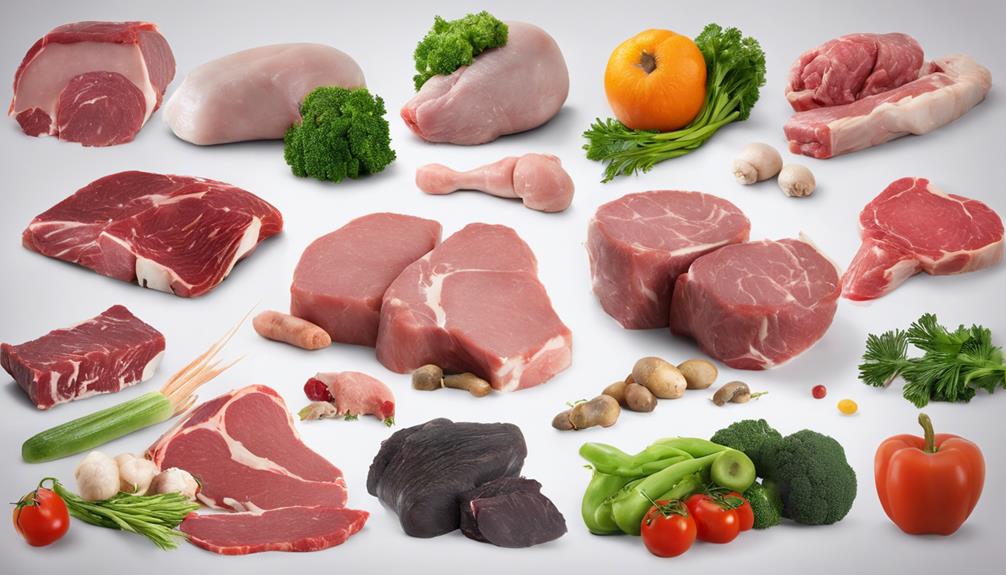
Creating a Balanced Meal Plan for Ferrets:
Uncover the secrets to their optimal health by understanding their unique dietary needs and exploring the components of a well-rounded diet.
Discover the ideal protein sources, carbohydrates, essential fats, vitamins, minerals, and hydration requirements for your furry friend to ensure their overall vitality.
Ferret Dietary Requirements
When considering ferret dietary requirements, it’s crucial to understand the specific nutritional needs of these small carnivores. Achieving a proper nutritional balance is essential for the overall health and well-being of ferrets. These animals require a diet high in animal protein, moderate fat content, and low carbohydrates. To ensure they receive adequate nutrition, it’s recommended to feed them high-quality commercial ferret food specifically formulated for their needs.
Establishing a consistent feeding schedule is also important when caring for ferrets. These animals have fast metabolisms and need to eat frequently throughout the day. Providing access to food at all times is ideal, as they’re opportunistic eaters. However, it’s crucial to monitor their intake to prevent overeating, which can lead to obesity and other health issues.
Protein Sources for Ferrets
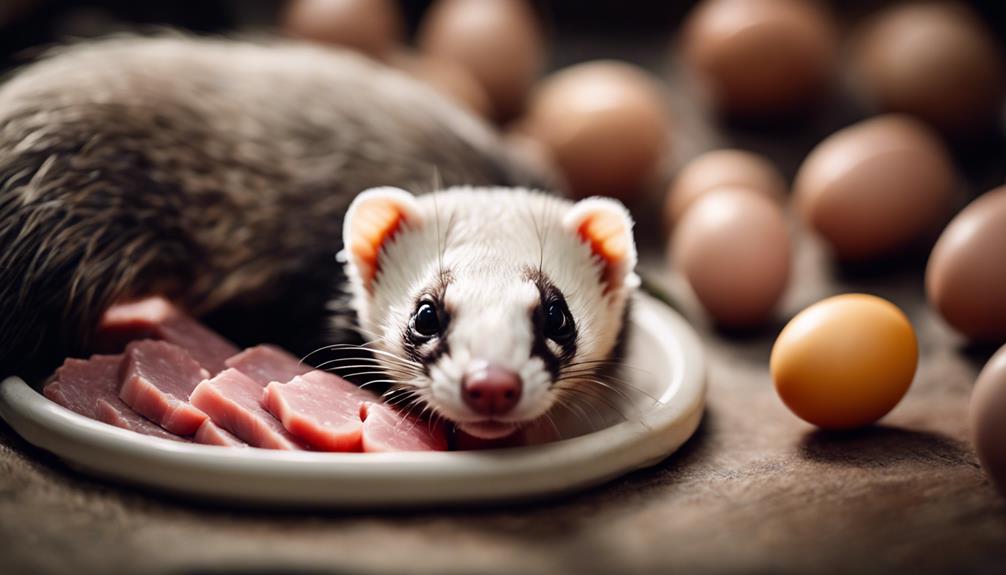
Ferrets require a diet rich in high-quality protein sources to meet their nutritional needs. Meat-based options like chicken, turkey, and lamb are excellent choices to provide the necessary protein content for ferrets.
Supplementing their diet with eggs can also offer a good source of protein and essential nutrients for these energetic pets.
Meat-Based Diet Options
For a well-rounded diet plan for ferrets, incorporating a variety of meat-based options rich in protein is essential to meet their nutritional needs. Ferrets are obligate carnivores, meaning their diet should primarily consist of animal-based proteins.
A raw diet, following a prey model, is often recommended for ferrets as it mimics their natural diet in the wild. This diet typically includes whole prey items like mice, rats, or chicks. However, for those who prefer not to feed whole prey, other meat options such as high-quality commercial raw diets specifically formulated for ferrets, as well as fresh meats like chicken, turkey, and beef, can be suitable alternatives.
Ensuring a balance of different protein sources will help provide the necessary nutrients for your ferret’s health and well-being.
Supplementing With Eggs
To further enhance the protein diversity in a ferret’s diet, supplementing with eggs can be a valuable addition to their meal plan. Eggs are a good source of high-quality protein for ferrets, providing essential amino acids necessary for their health. When choosing eggs for your ferret, opt for fresh, organic, and free-range varieties to ensure the best egg quality.
Egg Quality and Cooking Methods Table:
| Egg Quality | Description | Benefits |
|---|---|---|
| Fresh | Eggs that are recently laid | Rich in nutrients |
| Organic | Eggs from organically fed hens | Free from harmful chemicals |
| Free-Range | Eggs from hens with outdoor access | Higher omega-3 content |
When preparing eggs for your ferret, cooking methods like boiling or scrambling without added salt or oil are recommended to maintain the nutritional value.
Carbohydrates and Fiber
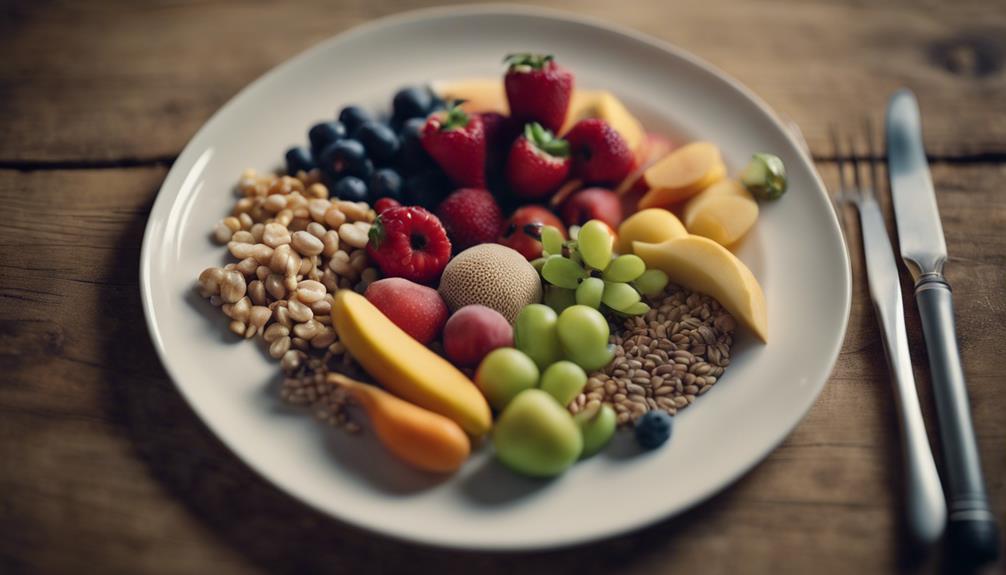
What role do carbohydrates and fiber play in a ferret’s diet for optimal health and nutrition? Carbohydrates and fiber are essential components of a balanced meal plan for ferrets, providing important nutrients and aiding in digestion. Here are some key points to consider:
- Carbohydrate sources: Ferrets can benefit from carbohydrates found in vegetables such as sweet potatoes, peas, and carrots. These can offer energy and essential nutrients.
- Fiber sources: Including fiber in a ferret’s diet can help with digestion and prevent gastrointestinal issues. Good fiber sources for ferrets include pumpkin and certain fruits like berries.
- Digestible carbohydrates: Opt for carbohydrates that are easily digestible for ferrets to avoid digestive upset. Cooked grains like rice or oats can be a good option in moderation.
- High fiber options: High fiber foods like leafy greens and certain fruits should be included in small amounts to support overall digestive health without causing excessive fiber intake.
Essential Fats and Oils
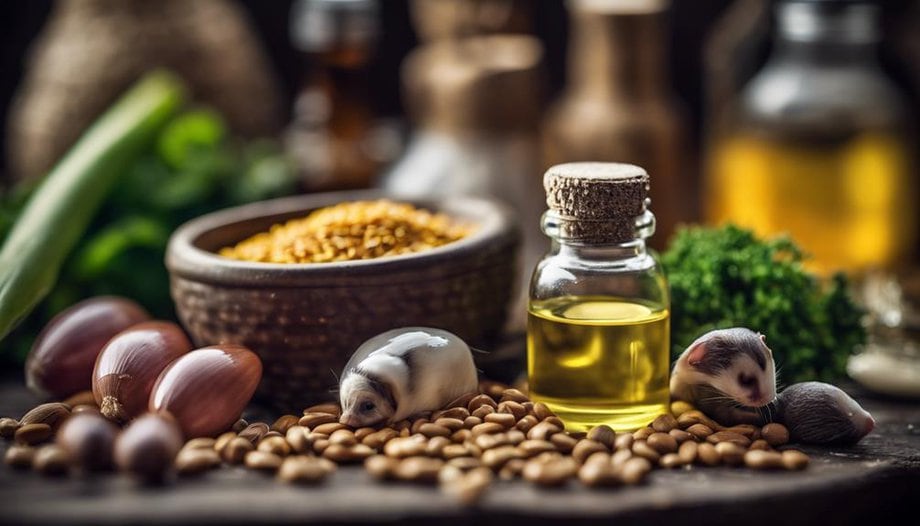
Ferrets require essential fats and oils in their diet to support overall health.
Omega-3 fatty acids offer numerous benefits, including anti-inflammatory properties and heart health support.
Coconut oil can be a suitable option for providing healthy fats to ferrets, but it’s essential to ensure a balanced intake of various fat sources for optimal nutrition.
Omega-3 Benefits
Essential fatty acids, such as Omega-3, play a crucial role in the overall health and well-being of ferrets. Omega-3 sources like fish oil offer various benefits for ferret health due to their high content of EPA and DHA. These fatty acids contribute to a healthy skin and coat, support cognitive function, and help reduce inflammation in ferrets. Including Omega-3 in a ferret’s diet can aid in maintaining a shiny coat and healthy skin, ensuring their overall well-being. It’s essential to provide a balanced meal plan that incorporates these vital nutrients to promote optimal health for your ferret.
- Omega-3 sources like fish oil are rich in EPA and DHA
- Supports a healthy skin and coat
- Aids in cognitive function
- Helps reduce inflammation
Coconut Oil Options
Omega-3 fatty acids are essential for ferret health, and exploring alternative sources such as coconut oil can provide additional benefits in their diet.
When considering coconut oil options for ferrets, it’s important to note that virgin coconut oil is the best choice due to its minimal processing, retaining more nutrients.
For cooking methods, coconut oil can be used in small amounts to sauté ferret-friendly vegetables or to mix with other oils for a balanced fat profile.
In terms of benefits, coconut oil can aid in maintaining healthy skin and a shiny coat when applied topically.
When used sparingly and appropriately, coconut oil can be a valuable addition to a ferret’s diet and skincare routine.
Proper Fat Sources
When incorporating fats into a ferret’s diet, it’s crucial to select proper sources that provide essential nutrients for their overall health and well-being. Essential fats and oils play a vital role in a ferret’s diet, aiding in fat digestion and providing necessary energy.
However, it’s essential to be mindful of the fat sources chosen to prevent issues like ferret obesity. Here are some recommended fat sources for ferrets:
- Salmon oil: Rich in omega-3 fatty acids
- Flaxseed oil: Another source of beneficial omega-3 fatty acids
- Chicken fat: Provides necessary fats for energy
- Sunflower oil: Contains omega-6 fatty acids essential for skin and coat health
Vitamin and Mineral Needs
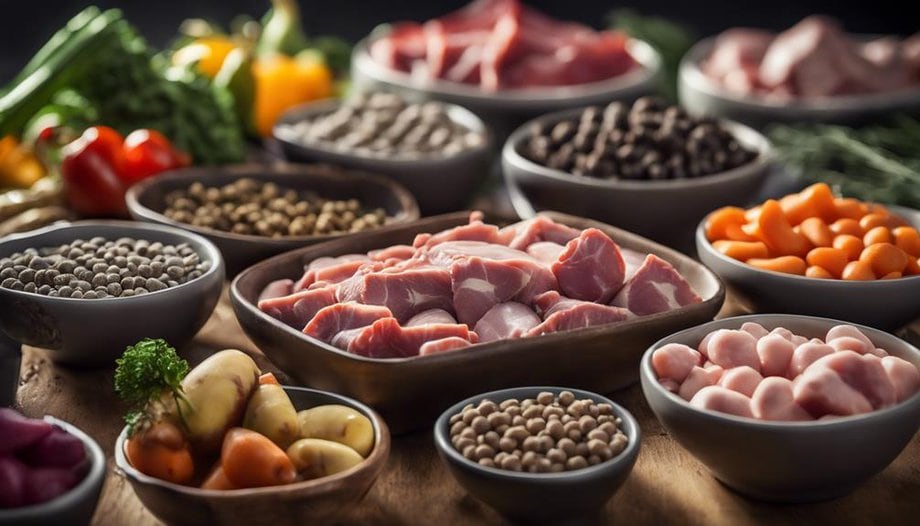
Understanding the vitamin and mineral needs of ferrets is crucial for maintaining their overall health and well-being. Ferrets require a balanced diet rich in essential vitamins and minerals to support their bodily functions. Dietary guidelines for ferrets emphasize the importance of providing adequate levels of vitamin A, D, and E, along with minerals such as calcium and phosphorus. These nutrients play a vital role in maintaining healthy bones, teeth, and overall growth and development.
To ensure optimal nutrient intake, ferret owners should offer a variety of high-quality commercial ferret foods that are specifically formulated to meet their dietary requirements. Additionally, incorporating small amounts of fresh meat or eggs into their diet can further enhance their nutrient absorption.
Balanced meals that contain the right mix of vitamins and minerals are essential for preventing deficiencies and promoting longevity in ferrets. By following recommended dietary guidelines and providing a well-rounded diet, ferret owners can help ensure their furry companions lead healthy and happy lives.
Hydration for Ferrets

Ensuring proper hydration is essential for maintaining the health and well-being of ferrets. Ferrets, like all animals, require adequate water consumption to support various bodily functions.
Here are some key points to consider when it comes to hydrating your ferret:
- Water Consumption: Ferrets should have access to fresh, clean water at all times. Ensure that the water is changed regularly to prevent contamination and encourage drinking.
- Hydrating Treats: Consider incorporating hydrating treats into your ferret’s diet, such as small pieces of fruits like watermelon or cucumbers. These treats not only provide additional fluid intake but also offer enrichment for your pet.
- Fluid Intake: Monitor your ferret’s fluid intake, especially during hot weather or if your ferret is sick. Dehydration can be dangerous for ferrets, so it’s crucial to ensure they’re drinking enough water.
- Water Sources: While water is the best source of hydration for ferrets, you can also offer them wet food to increase their overall fluid intake. Wet food contains more moisture than dry food, helping to keep your ferret hydrated.
Meal Planning Tips
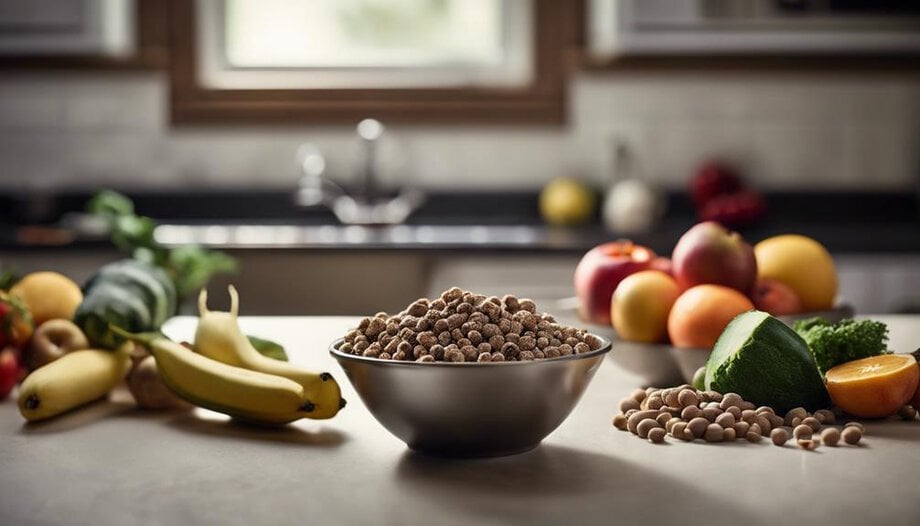
To create a well-rounded meal plan for ferrets, consider incorporating a variety of protein sources, essential nutrients, and appropriate portion sizes. Portion control is crucial for maintaining a healthy weight in ferrets. Overfeeding can lead to obesity and related health issues, while underfeeding can result in nutrient deficiencies. Aim to provide measured amounts of high-quality ferret food to meet their daily caloric needs.
It’s essential to balance the nutrients in their diet to support overall health. Ensure that the meal plan includes protein for muscle maintenance, fats for energy, and vitamins and minerals for various bodily functions. Additionally, ferrets require a diet rich in animal-based protein, as they’re obligate carnivores. When planning meals, consider rotating protein sources such as chicken, turkey, and lamb to provide a diverse nutrient profile.
Frequently Asked Questions
Can Ferrets Eat Fruits and Vegetables as Part of Their Balanced Meal Plan?
Ferrets can consume fruits and vegetables as part of their balanced meal plan. Fruit options like apples and berries, along with vegetable choices such as bell peppers and carrots, can provide essential nutrients. It’s crucial to ensure nutritional balance and monitor meal frequency.
How Often Should I Change up My Ferret’s Meal Plan to Ensure They Are Getting a Variety of Nutrients?
To ensure ferrets receive a variety of nutrients, changing schedules is key. Nutrient rotation benefits their health by providing a balanced diet. Varying their meals regularly ensures they get all the essential nutrients necessary for optimal health.
Are There Any Specific Foods That Ferrets Should Avoid in Their Diet?
Ferrets should avoid harmful ingredients like fruits, vegetables, dairy, grains, and sugary treats. Opt for a diet rich in animal protein and fat. Common misconceptions include feeding plant-based foods. Follow dietary guidelines to provide a balanced meal plan.
Can I Give My Ferret Supplements to Make Sure They Are Getting All the Necessary Nutrients?
Supplement safety is crucial for ferrets. While a balanced diet can meet their dietary needs, adding supplements should be done under veterinary guidance. Nutrient variety is essential to ensure they receive all necessary vitamins and minerals.
How Can I Tell if My Ferret Is Getting Enough Hydration in Their Diet?
Ensuring proper hydration levels in ferrets is vital for their health. Observing behavior changes like lethargy or dry gums can indicate dehydration. Monitoring water intake daily and offering fresh water sources will help maintain their well-being.











